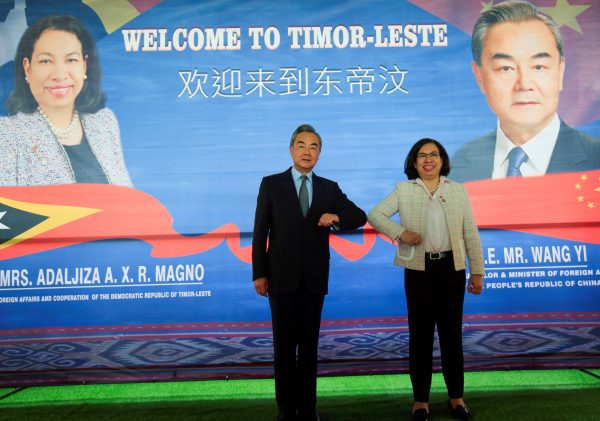This shows the importance of understanding what Timor-Leste wants from its international partners, and how Australia can position itself as a genuine partner responsive to Timor-Leste’s needs. In line with the message of Australia’s new international development policy, Australia should be listening to Timor-Leste voices and concentrating resources on issues that matter most to them.
The Asia Foundation and the Asia-Pacific Development, Diplomacy & Defence Dialogue (AP4D) have gathered data that gives valuable insights into Timor-Leste’s priorities. Focus group discussions were held with 24 civil society organisations from across Timor-Leste while online consultation sessions garnered views from 23 Australian and Timorese academic and other experts.
Consultations confirmed the important role for Australia to be an effective partner in building human capital and in strengthening democratic processes and institutions. Put together, both sets of consultations suggest a focus on exploring opportunities in partnering on health, education and institutions as an immediate priority.
Participants shared their vision of Timor-Leste as a prosperous country, the challenges to achieving this vision and areas where international partners can contribute to the country’s development. Five primary themes emerged.
The first was access to basic services. A country needs access to well-maintained public amenities. This includes a reliable healthcare system, high-quality education services and efficient infrastructure.
Next was inclusive development. To ensure inclusion, every citizen has the right to clean water, quality education and quality health care without being discriminated against because of their political beliefs, age, gender identity or sexual orientation. This includes zero tolerance for gender-based violence.
Quality education was also discussed. A well-developed education system accessible to every citizen includes an improved curriculum, well-trained teachers and better school infrastructure.
Security and justice for all was also important. A fair and transparent justice system and accessible legal services can improve a nation’s stability. Accountable law enforcement services can build a credible juridical system. A peaceful society creates a platform that allows its citizens to thrive economically.
Strong institutions and good governance are also a must — this means no corruption, united and synchronised leadership, and policies and programs that are contextually relevant to the country’s unique needs and priorities. Decentralising government is essential to ensure the sustainability of investment in services and building a sense of grassroots community ownership.
Utilising four priority areas of Timor-Leste’s current Strategic Development Plan — social capital, economic development, infrastructure development and governance — participants identified priorities that international development partners could further support. Comparing their priorities with those areas where there is already significant progress or investments, six areas were identified as requiring additional development partner support. In the area of social capital, education, health, social inclusion and the environment were rated as most important. For infrastructure development, both roads and bridges and water and sanitation were immediate issues. And for Timor-Leste’s institutional framework structure, justice was marked at urgently needing more support.
This suggests there is significant opportunity for Australia to strengthen its partnership with Timor-Leste, its people, and its government in a way that responds to Timorese priorities.
Australia should continue to expand investments supporting Timor-Leste to improve delivery and standards of education, and facilitate academic exchanges and scholarships. Given its importance as a commercial and diplomatic language, Australia can support English language education as a supplement to Timor-Leste’s official languages of Portuguese and Tetum. As the working language of ASEAN, strong English capabilities will be critical as Timor-Leste moves towards membership of the regional bloc.
In health, Australian assistance can continue to help improve water, sanitation and hygiene infrastructure. This assistance can enhance service delivery and draws lessons from Australia’s National Disability Insurance Scheme to provide greater civic participation for people with disabilities. Australian support in health was visible during the COVID-19 pandemic, with Australia becoming a critical partner in vaccine distribution and equity. Australia’s collaboration with the Timorese government to improve maternal and child health and strengthen government healthcare capacity is a strong foundation for future support.
Responding to Timorese perspectives will also include increased attention towards social inclusion, environmental protection, agriculture, rural development, basic infrastructure and justice. To advance these areas, it will be critical for Australia to support the strengthening of Timorese institutions in a way that ensures that they are effective, capable, legitimate and responsive to people through local processes.
Australia’s foreign and development policy has consistently identified Timor-Leste as a country of immediate importance. Timor-Leste’s recent comprehensive strategic partnership with China will only intensify this. A shared future for Australia and Timor-Leste would see Australia focusing on how it can be a trusted partner that sees its own national interest in Timor-Leste achieving its development goals.
Melissa Conley Tyler is Executive Director of the Asia-Pacific Development, Diplomacy & Defence Dialogue (AP4D).
Héctor Salazar Salame is the Country Representative for the Asia Foundation in Timor-Leste.
Zofimo Corbafo is the Managing Director of Tebedai Solutions.
This draws upon AP4D’s report What does it look like for Australia to Shape a Shared Future with Timor-Leste, funded by the Australian Civil-Military Centre. The authors thank all those involved in the consultations for the report.

